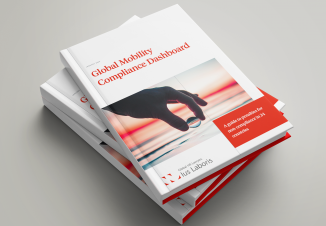
1. GUIDANCE
1.1 Has any guidance been issued on how EEA/Swiss nationals can obtain settled residence status and permission to work and what proof of residence is needed for current residents?
Please note that the information in this article does not apply to Irish nationals, who are considered to be settled in the UK.
Implementation period
An ‘implementation period’ was in effect from 23:00 on 31 January 2020 (GMT) until 23:00 on 31 December 2020 (GMT). During the implementation period, the UK applied arrangements similar to the free movement of persons that existed prior to Brexit. These arrangements have now ended.
EU Settlement Scheme
EEA/Swiss citizens must apply under the EU Settlement Scheme for settled or pre-settled status if they became resident in the UK by the end of the implementation period. This includes all workers who became resident in the UK by this date. Existing family members of workers could also apply if they became resident in the UK by 31 December 2020, as long as the worker is either eligible under the scheme, or they began working in the UK by 31 December 2020 and they continue to do so.
To qualify for settled status, a period of five years’ continuous residence in the UK will normally be required. Pre-settled status is granted for five years and a further application for settled status should be made once five years’ residence is reached, and before the pre-settled status expires.
For those already residing in the UK, an initial application must be made under the scheme by 30 June 2021.
Family members residing outside the UK will be able to apply to join an EEA/Swiss citizen who has status under the scheme at any point in the future, provided their relationship with the EEA/Swiss citizen existed by 31 December 2020 and is ongoing at the time of application. There is also an exception for children born abroad, who may apply at any time after their birth.
Frontier workers
Frontier workers, who began work or self-employment in the UK before 31 December 2020 but reside in the EEA, will be able to be recognised as having frontier worker status.
Frontier workers must:
*Individuals who have been working in the UK for a year or more but are currently unable to work (as a result of an illness, involuntary unemployment, training, pregnancy and maternity leave) will retain their frontier worker status for six months, or longer if they can show compelling evidence of continuing to seek work in the UK. Those who previously worked in the UK for less than a year will retain their status for six months only.
Between 1 January 2021 and 30 June 2021, frontier workers can travel to the UK using their current passport or national ID card (they may need to provide evidence of their frontier working, i.e. employment/self-employment confirmation documents, upon request). A new scheme opened on 10 December 2020 to enable frontier workers to submit an online application to get digital confirmation of their status. For any travel to the UK after 1 July 2021, a frontier worker must hold digital confirmation of their status.
The application for frontier workers is free to apply for (either in or outside the UK). There is no deadline for applications. Frontier workers will get status for five years (or two years if they are currently are not working and have retained their status). Frontier worker status can be renewed indefinitely but does not lead to permanent residence in the UK.
Arrivals after the end of the implementation period
The Government has introduced a new immigration system. EEA/Swiss citizens and their family members who wish to live in the UK after 23:00 on 31 December 2020 (GMT) will need to apply under the new system, if they are not eligible under the EU Settlement Scheme.
There are two types of main work visa categories that EEA/Swiss citizens and their family members are likely to apply for:
Skilled Worker visa
The general salary threshold for this route is GBP 25,600 (with some exceptions to reduce this and also to increase this according to market rate for their particular role), minimum skill level is RQF Level 3 (A Levels or equivalent), and the applicant must meet the English language requirement.
Intra-Company Transfer visa
This route is suitable for existing employees working for international companies at their overseas branches. The minimum salary is GBP 41,500 if the individual has been employed overseas for at least 12 months, or GBP 73,900. The minimum skills level is RQF Level 6.
There are other less common work visas such as the Sole Representative, Start-Up and Global Talent visas that can be useful in the right circumstances. The Skilled Worker, however, is by far the most common and the most likely.
Following the end of the implementation period, applications for these immigration categories can now be made for EEA nationals, both from abroad or within the UK.
2. BUSINESS TRAVEL
2.1 Do EEA/Swiss employees need a business visa from 1 January 2021?
Arrangements similar to free movement of persons continued to apply until 31 December 2020.
From 1 January 2021, is not required for business visits.
However, the Government plans to introduce an electronic travel authorisation (ETA), which will require the completion of an online form and payment of a small fee prior to travel. It is proposed that the ETA will be valid for multiple entries over an extended period. The implementation date for the ETA system is not yet known but is likely to be 2021 at the earliest. The Government intends to require EEA/Swiss nationals to apply for an ETA once the system is in place, subject to any agreement with the relevant countries to the contrary.
2.2 What documents are needed on arrival for business travel from 1 January 2021?
From 1 January 2021, a valid passport or national ID card is required, however the UK government intends to phase out the use of national ID cards from 1 October 2021. As an exception, EEA/Swiss nationals in the following categories will be allowed their national ID card to enter the UK until at least 31 December 2025:
An invitation letter listing reasons for business travel may be helpful but is not mandatory.
2.3 Do EEA/Swiss nationals need additional permission to work for business travel from 1 January 2021?
The business visitor arrangements outlined above, does not permit ‘work’ only ‘permissible activities’ such as attending business meetings, as summarised below. For anything that falls outside of the permissible activities, they will require a work visa.
From 1 January 2021, a formal invitation letter from an organisation specified by the UK government is required if the person intends to undertake permitted paid engagements in certain circumstances as an academic, lecturer, designated pilot examiner, lawyer or professional artist, entertainer, musician or sportsperson.
If an EEA/Swiss national is not a professional in one of the categories above, they are not permitted to work in the UK. Activities of business visitors must be restricted to the following:
3. EMPLOYMENT AND RESIDENCE
3.1 Do EEA/Swiss nationals need permission to work and stay in the UK from 1 January 2021?
Yes.
EEA/Swiss nationals relocating to the UK after 31 December 2020 must have permission to work in the UK.
EEA/Swiss nationals residing in the UK by 31 December 2020 and eligible for the EU Settlement Scheme must apply for settled or pre-settled status by 30 June 2021.
Frontier workers working in the UK by 31 December 2020 must obtain digital confirmation of their status by 1 July 2021 to be able to continue to enter the UK in this capacity from this date.
3.2 If permission to work is needed after 1 January 2021, do any quotas apply to the employment of third-country nationals?
No.
The UK has suspended quotas for work permissions for the time being.
3.3 If permission to work is needed from 1 January 2021, what categories of permission are commonly granted?
The categories under the new immigration system are:
The T5 International Agreement category has been expanded in line with the UK-EU and UK-Switzerland trade deals negotiated between the UK. This route is not commonly used but may provide an option for contractual service sellers and independent professionals in specific industry sectors who need to come to the UK for up to 12 months.
3.4 If permission to work or stay is needed from 1 January 2021, how long does the procedure take?
The employer must hold a licence under the relevant category in order to sponsor a worker. If they do not have a sponsor licence yet, obtaining one normally takes four to eight weeks from the date the application is submitted.
The application process for the individual normally takes between three to eight weeks (depending on the country of application) and requires the following steps:
There are also various priority services available for an additional cost. Processing times for priority visa applications can vary from 24 hours to five working days, depending on availability and service chosen.
3.5 If permission to work and stay is needed from 1 January 2021, what Government fees are payable?
For Skilled Worker and Intra-Company Transfer visas, fees are:
Under the Council of Europe’s Social Charter of 1961 (‘CESC’), a discount of GBP 55 will apply to the Certificate of Sponsorship and the visa application fee for citizens of Austria; Belgium; Croatia; Cyprus; Czech Republic; Denmark; Finland; France; Germany; Greece; Hungary; Iceland; Italy; Latvia; Luxembourg; Malta; Netherlands; North Macedonia; Norway; Poland; Portugal; Slovak Republic; Spain; Sweden and Turkey.
The above fees may vary depending on the size of the employer, type of the role and country of application. These fees are also subject to change as the Home Office updates the processing fees periodically.
4. FRONTIER WORKERS
4.1 What formalities apply to frontier workers working in the UK but living in the EEA from 1 January 2021?
Frontier workers, who began work or self-employment in the UK before 31 December 2020 but reside in the EEA, are able to be recognised as having frontier worker status.
Frontier workers must:
*Individuals who have been working in the UK for a year or more but are currently unable to work (as a result of an illness, involuntary unemployment, training, pregnancy and maternity leave) will retain their frontier worker status for six months, or longer if they can show compelling evidence of continuing to seek work in the UK. Those, who previously worked in the UK for less than a year, will retain their status for six months only.
Between 1 January 2021 and 30 June 2021, frontier workers can travel to the UK using their current passport or national ID card (they may need to provide evidence of their frontier working, i.e. employment/self-employment confirmation documents, upon request). A new scheme opened on 10 December 2020 to enable frontier workers to submit an online application to get digital confirmation of their status. For any travel to the UK after 1 July 2021, a frontier worker must hold digital confirmation of their status.
The application for frontier workers is free to apply for (either in or outside the UK). There is no deadline for applications. Frontier workers will get status for five years (or two years if they are currently are not working and have retained their status). Frontier worker status can be renewed indefinitely, but does not lead to permanent residence in the UK.
5. PERMANENT RESIDENCE
5.1 From what date are third-country nationals entitled to apply for permanent residence?
Permanent residence is normally after five years in work-related categories that lead to settlement. Permanent residence is not available for temporary or frontier workers, unless they switch to one of the other immigration categories.
6. SECURING RESIDENCE AND WORK STATUS
6.1 What steps could EEA/Swiss nationals take currently to secure their residence and work status?
Currently EEA/Swiss nationals should consider:
Family members should consider:


